
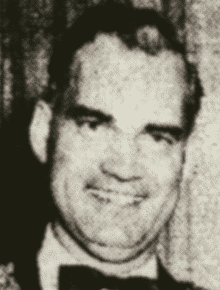
George Vydra
A combination of conflicting interests - a grocery business long visited by Chicago mobsters, an anti-corruption political career and a midlife obsession with a night club singer married to another - drove a Berwyn, Illinois, alderman to dealings with underworld figures, to secret betrayals of their trust and, ultimately, to an untimely death.
George Vydra was a foreign-born United States citizen, who entered the U.S. in October 1922 as a three-month-old baby. He grew up in the Chicago suburb of Berwyn, Illinois, with his parents and two brothers. In the 1920s, Vydra’s father, Frank, opened a butcher shop and grocery at 1602 East Avenue address in Berwyn. [1] George and his brothers eventually took over that business. According to family lore, Chicago underworld boss Al Capone shopped there when he passed through town.
As an adult, George Vydra acquired a fine reputation in the community, operating "Vydra Produce" and volunteering at local charities. He was twice consecutively elected the "exalted leader" of the local Elks lodge and was on a first-name basis with the Illinois governor. Vydra won election to the Berwyn City Council in 1959, becoming the Democratic alderman from the small city's Sixth Ward. He campaigned on a platform of balancing the budget and keeping out organized crime.
In those days, an alderman was not a full-time job, and Vydra had a side venture managing aspiring singer Jane Darwyn.
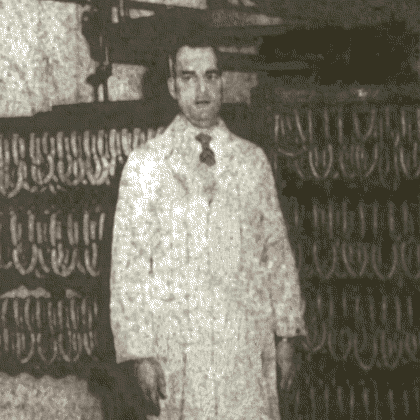
George Vydra, thirty-five, in the smoke house of Vydra Produce Company, 1602 East Avenue in Berwyn (Berwyn Life, April 27, 1958).
On Christmas morning 1964, Frank Vydra discovered the lifeless body of his forty-two-year-old son, George, in a truck parked inside a garage at the East Avenue business address. The truck ignition was off, but all signs pointed toward Frank Vydra dying from carbon monoxide poisoning. A rope tied to the inside of the driver's door made it difficult to open. Vydra’s unfortunate death would not have been particularly noteworthy except for a mysterious document found inside his jacket pocket.
In the four-page suicide letter, Vydra lamented that the woman he loved, Jane Darwyn, had taken him for "$50,000" and "cast me aside for someone else." [2] The former alderman hinted at something sinister when he added that he had been "walking a tightrope" and that the Federal Bureau of Investigation knew all about "my story."
The Chicago Tribune reported that Vydra had business dealings with racketeer Sam English and was in debt to Mafia loan sharks. Prominent law enforcement official Charles Siragusa stated that he found Vydra’s death suspicious. "These are unusual circumstances," Siragusa said. "Something smells here." [3]
To shut down speculation and reassure the public that the Mafia - known in the Chicago area as the Outfit - was not assassinating politicians, coroner Andrew Toman authorized an inquest including witness statements and a complete toxicology examination to determine an exact cause of death.

The inquest into Vydra’s death began on December 30, 1964; it was split into two sessions and lasted two weeks. The public found the mix of the Mafia, politics and jilted love irresistible, making the event front-page news.
Vydra's former client Jane Darwyn testified that she had recently dropped Vydra as her manager after years of limited success. She indicated he drank too much and had been an ineffective representative. She said he was still upset over his wife’s death a year earlier. (Ruth Slepicka Vydra died in November 1963 at the age of fifty-two. She and George Vydra had been married for nineteen years.)
In his suicide letter, Vydra claimed he and Darwyn had lived as "man and wife," but she denied there had been a romantic relationship.
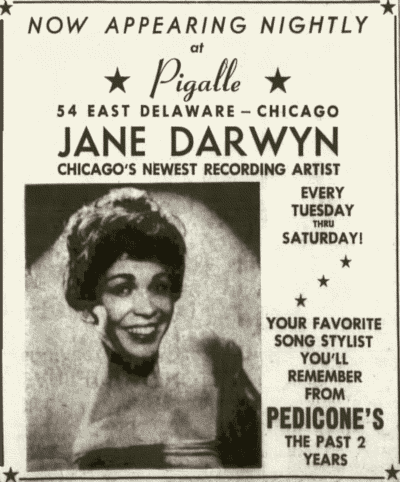
Jane Darwyn advertisement
Darwyn said she and Vydra entered the recording business together to promote her records. She initially denied that Sam English had any role in the venture. However, she later admitted that was inaccurate, and she, Vydra, and English split profits from her recording career three ways. She claimed she earned only $5,000.
As for knowing anything about the missing $50,000 mentioned in Vydra’s suicide note, Darwyn said, "I certainly haven’t got it."
Darwyn said Vydra called her the evening he died. "He wished me a Merry Christmas," she said. "But he sounded depressed. He’d been that way a long time."
Frank Vydra testified that his son’s death was unexpected. He stated that he was unaware of any relationship his son had with either the Outfit or Darwyn. Joseph Vydra, George’s brother, testified at the inquest that he never met Darwyn or knew anything about her. The Vydra family attorney said George Vydra had suffered from a "serious stomach ailment," but the family was skeptical he would kill himself. [4]

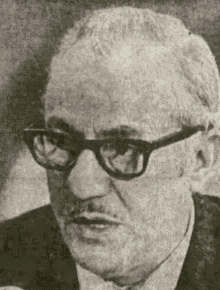
Siragusa
Charles Siragusa almost singlehandedly tried to connect George Vydra’s death to an Outfit murder plot. A former federal narcotics agent, Siragusa headed up the Illinois Crime Investigating Committee, an organization created by the state legislature to investigate organized crime. Although he was not part of the original investigation, Siragusa took a professional interest in Vydra’s death because of the reported connection to organized crime.
(Siragusa’s crime commission held hearings of its own into Vydra’s death. He barred the media from attending the sessions, and the commission's findings were never published.)
Siragusa told the coroner’s inquest that he believed Vydra might have been "loaded with drinks" by unnamed individuals at an unspecified location and then taken to the garage at his parent’s home, where he also lived. Siragusa proposed that persons unknown then placed Vydra in the truck to make it look like he killed himself - a "simulated suicide." [5]
Siragusa suggested Vydra’s business dealings with Sam English led to his murder. He speculated that Vydra could not pay back money borrowed from loan sharks to promote Darwyn’s singing career. The coroner subpoenaed the English brothers to testify, but they ducked the inquest by leaving town.
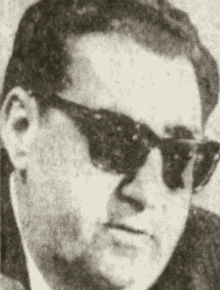
Sam English
Siragusa wondered how Vydra could have died of carbon monoxide poisoning if the truck engine was not running when Frank Vydra discovered his son’s body. "Dead men don’t turn off engines." [6] Siragusa also cast doubt on the suicide letter’s authenticity.
Expert witnesses disputed Siragusa’s testimony. A Berwyn police department official stated it was not uncommon to find suicide victims in the condition police found Vydra. In all likelihood, Vydra had second thoughts about killing himself, turned off the ignition, but the exhaust overcame him before he could escape. Police found no bruising on the body to suggest foul play.
Vydra’s family and a handwriting expert confirmed he wrote the suicide note. The content of the letter supported the suicide theory. In it, Vydra wrote, "They say only a coward kills himself, but it really takes a great man to do it, and step out of the picture."
Siragusa later backed down from his allegation that Vydra was murdered, which drew scorn from law enforcement officials. They accused him of seeing conspiracies and seeking to prosecute individuals without providing the necessary evidence.
On January 14, 1965, the coroner’s jury returned with a verdict of "suicide while the decedent was in a despondent frame of mind." It concluded that "George Vydra came to his death ... at the rear of his garage ... from and as a result of carbon monoxide poisoning and alcoholism." [7]
The verdict ended official suspicion that the Outfit murdered Vydra, although speculation to the contrary persisted. One Chicago columnist concluded, "There are those who believe Alderman George Vydra died because his true identity was discovered and he actually was an informant for the FBI. If this is true, it will never be revealed." [8]
The FBI assigns symbol codes to protect an informer’s anonymity. The FBI deliberately makes it hard to unmask the individual behind the symbol code by redacting incriminating details like birthplace or criminal history. Nonetheless, clues sometimes slip past FBI censors. In Vydra’s case, an intelligence report plainly stated that "CG 6575" was Jane Darwyn’s manager.
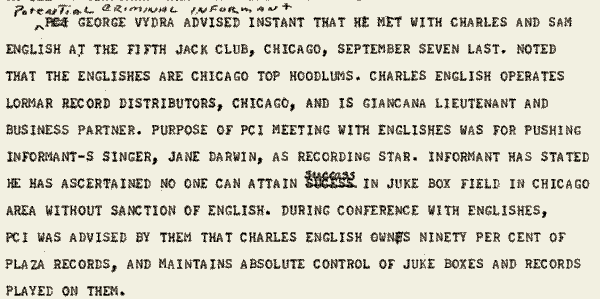
FBI Teletype, Sept. 1, 1962. [11]

FBI microphone surveillance, Nov. 1, 1962. [12]
Marlin W. Johnson, then head of the FBI’s Chicago office, declined to comment publicly regarding the Bureau’s alleged relationship with Vydra. [9] The FBI typically refrained from acknowledging an individual’s cooperation, unless he became a witness and testified in court. The policy was designed primarily to protect informers from retaliation and to encourage the development of more informers. Most informers, who were often not criminals themselves, would never cooperate if they knew their cooperation would be revealed.
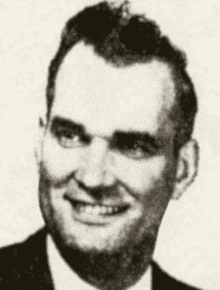
Vydra
But not all secrets remain buried. The FBI recently declassified intelligence reports related to the Outfit’s control of Chicago’s jukebox industry, as a result of requests made under the Freedom of Information Act. These reports were not specific to Vydra but shed light on his contacts with the Outfit, using Intel supplied by confidential informers.
Federal agents write intelligence reports with the informers' anonymity in mind. Instead of identifying them by name, federal agents usually refer to them using symbol codes, making it hard to deduce who they are.
However, a careful reading reveals Vydra was a confidential informer. He began to cooperate in 1962 and talked to federal agents the whole time he rubbed elbows with the Outfit. The FBI assigned him symbol code "CG 6575." [10] The reports provide insight into Vydra’s secret relationship with the FBI and reveal how a small-town politician got mixed up with the Mafia.
George Vydra met Jane Darwyn in 1961. He was a small-town politician married to a school teacher eleven years older than him. [13] At the time, Vydra had just received a clean bill of heath after beating stomach cancer.
Darwyn was a struggling singer in her early 20s, married with two children. She billed herself as a "chanteuse," and sang cabaret standards. Jet, a popular weekly magazine focusing on an African-American readership, described her as "slender but bosomy."
Vydra was captivated by her voice and look and decided to become her manager. He turned to an old acquaintance with underworld connections for help.
Born in Chicago in 1912, Sam English operated gambling and extortion rackets from Fifth Jack’s tavern on the city's West Side. Known as "Fat Sam" because he was heavyset, English had a long police record with burglary and bookmaking arrests. In 1958, he appeared alongside Anthony Accardo before a United States Senate rackets committee investigating labor racketeering. In underworld circles, his younger brother Charles English, a lieutenant of Outfit boss Sam Giancana, often overshadowed him.
Vydra and Sam English had been friends since 1950. English lived in the Berwyn-area and shopped at Vydra’s store, spending $50 weekly on groceries. English used the store as a hangout spot. [14]
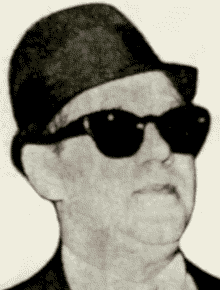
DeStefano
English reportedly helped Vydra open an upscale supper club called the "Continental West" in a working-class suburb of Chicago to showcase Darwyn's talents. Vydra invested $5,000 in it. [15] The supper club operated from a building owned by notorious loan shark Sam Destefano, who peddled loans from an office on the premises.
Vydra had high hopes for the venture, but it was a flop. He had trouble getting a liquor license, and the locals stayed away. The public wanted to hear rock and roll, not songs from a bygone era.
Soon after they partnered up, English demanded Vydra install slot machines at his Elks lodge. Slot machines were a profitable but illegal gambling enterprise widespread throughout the state. The demand tested Vydra’s friendship with English since it could ruin Vydra's political career if it got out. Vydra agreed to install the machines, but he secretly provided federal agents with details of English's operation and all the money he made. [16]
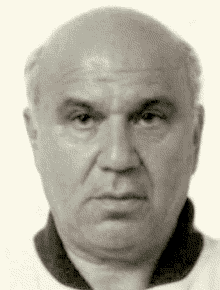
Infelise
After the supper club's failure, Rocky Infelise came to Vydra with another business proposition. Infelise would become notorious in the 1980s as a high-ranking Outfit member, but at the time, he was an associate active in Chicago’s nightclub scene. He offered to sell Vydra a drinking establishment he owned called the "Guest House" for $65,000.
Infelise hosted illegal card and dices games for gamblers. He told Vydra he had to sell his business because of police harassment. [17] Infelise indicated that Vydra could continue to allow gambling on the premises, provided Infelise got a cut. After losing money at the "Continental West," Vydra passed on the offer.
In the months following the supper club’s closure, Vydra tried to bolster Darwyn’s profile by booking singing gigs at mob-owned venues like Pigalle and Pedicone’s and the Playboy Clubs in Chicago and New Orleans. Vydra pulled strings for her to sing in front of the Illinois governor at an Elk's gala event.
However, Vydra realized if Darwyn was going to break through, she needed to become a recording star. For that, he needed more than Sam English’s help.
In the 1950s and 60s, the Outfit dominated certain aspects of Chicago’s music industry. Vydra told federal agents that Outfit boss Sam Giancana maintained "absolute control over the juke box and entertainment field" through Charles English. [18]
Charles English operated Lormar Distributors, which had a virtual monopoly determining what records filled Chicago-area jukeboxes. Vydra claimed that "no one can attain success in the Juke Box field in Chicago area without sanction of English." [19] He maintained control using corrupt union officials like Fred Tom Smith and Joseph Glimco, who devised industry regulations favoring mobsters. [20] It granted English leverage to make or break new artists.
Record labels often had to pay a kickback to ensure English carried their records on his jukebox machines throughout Chicago. For example, Vydra told federal agents that Charles English demanded M.S. Distributing pay a bribe equal to fifteen percent of record sales before stocking their company records on his machines. The company refused English's demand, so he turned them down. [21]
George Vydra invited Charles English to hear Darwyn perform and gauge his interest in promoting her. English was impressed and had Darwyn perform at a wedding reception at the Palmer House Hotel attended by Sam Giancana. According to Vydra, Giancana enjoyed her performance, so Charles English arranged for her to record six singles on recording labels linked to him. [22] Giancana’s endorsement led to her appearing at a club he owned called "Villa Venice" as Frank Sinatra’s opening act. [23]
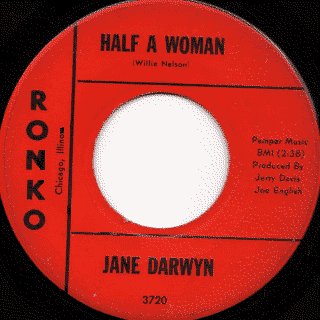
A Darwyn "single"
Among the approximately six records Darwyn recorded with the Outfit's assistance was a Willie Nelson composition called "Half a Woman." Released in 1963, Darwyn adapted the song from "Half a Man," which Nelson released a few months earlier. Two Chicago-based labels, Ronko and VeeJay, and Phoenix-based Ramco distributed the record.
Billboard, the music trade magazine, reviewed Darwyn’s record and declared she had "a wide, heartbreaking sound" and used it "to full advantage..." [24] Despite the positive review, the song failed to chart.
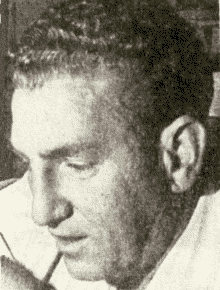
Joe English
The record provided no suggestion that Darwyn had the Outfit's backing save for one tiny clue. Joe English, Sam’s younger brother, was credited as a producer on "Half a Woman" as he was on many of Darwyn’s records. According to Sam English, Joe moved to Phoenix from Chicago in the 1950s and "had been eatin’ sand down here for seven years." [25]
Joe English operated a record store called "Flash Records." He was known more for selling counterfeit records from the back of his store than his production skills. When someone questioned why Joe was the producer, Sam replied, "Why not? He’s clean. He fought for this country." [26]
Along the way, Vydra may have borrowed or run up a debt of $50,000 with loan sharks to promote Darwyn’s recording career. The available intelligence reports do not confirm that he borrowed the money or if it factored in his decision to help law enforcement. However, Vydra’s suicide letter implied he regretted spending the money.
While George Vydra was using the Outfit to launch Darwyn’s singing career, he also was secretly meeting with federal agents. As early as July 1962, the FBI identified Vydra as a "Potential Criminal Informant," the designation reserved for an individual under development as a source. It’s unclear who made the first approach, but Vydra’s burgeoning business relationship with Sam English made him an attractive target for federal law enforcement.
During the initial months of their informal relationship, Vydra kept the FBI updated on his business dealings with the English brothers. The reports freely used his name during this early period because the FBI only considered him a "PCI," not a full-fledged informer.
In October 1962, however, the FBI formalized its secret ties with Vydra and upgraded him to a "Top Echelon" informant, the Bureau’s highest designation for confidential sources. From here on in, when Vydra talked to federal agents, he was identified in intelligence reports as "CG 6575."
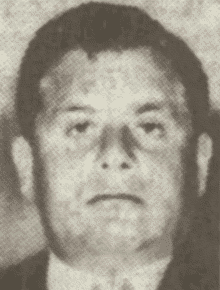
Skar
Vydra discovered having a mobster in his corner had an upside. Charles English used his influence to help Vydra book Darwyn a singing gig at the Sahara Inn Motel in suburban Chicago. The Sahara was a notorious mob hangout owned by Manny Skar that hosted big-name entertainment acts in the 1960s. Ralph York, the Sahara’s booking agent, hired Darwyn to perform for two weeks at a fee of $4,000. According to Vydra, York demanded she kick back half of it as part of the deal.
Vydra complained about the kickback demand to Sam English, who told Vydra he would "straighten that bunch out." [27] English tracked down Skar and threatened him with bodily harm if he did not pay Darwyn the total amount, which he agreed to do. English also forced Skar to cover the additional cost of Darwyn’s backup band.
Kickbacks were routine at the Sahara, but Skar’s bribery demands could have been partly motivated by personal animosity. Vydra told federal agents that he had refused Skar’s request to operate a "floating crap game" in Berwyn a few months earlier. [28] Skar wanted Vydra to give him political cover to keep law enforcement from investigating his activities.
Skar lost control of the Sahara in 1963 after falling deeply in debt and defaulting on the mortgage payments. Outfit loansharks provided Skar with funds for the business. An unknown gunman murdered Skar in 1965 after he reportedly agreed to testify against his underworld associates.
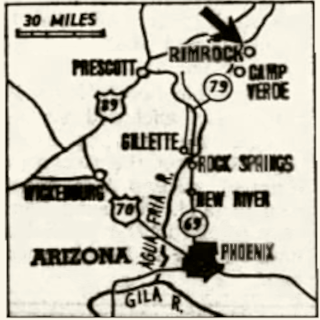
Rimrock, Arizona
After they partnered up in the music business, Sam English let Vydra know about other confidential underworld business dealings. English said the Outfit had a "big deal" going on in Acapulco, Mexico, and had invested millions in a hotel and casino in anticipation of legalized gambling in the area. [29]
In 1962, English confided that he and his brother Charles had invested $331,000 of Outfit funds in an Arizona property. The Outfit had so much money coming in from gambling, loansharking and other illegal activities that members like the English brothers and Sam Giancana had to look outside Illinois for suitable investment opportunities.
Under the name of their Arizona-resident brother Joe, Sam and Charles English purchased the 265-acre "dude" ranch located ninety miles north of Phoenix. The ranch was among the oldest in the state, dating back before World War I. Deer, antelopes and mountain lions roamed the property.
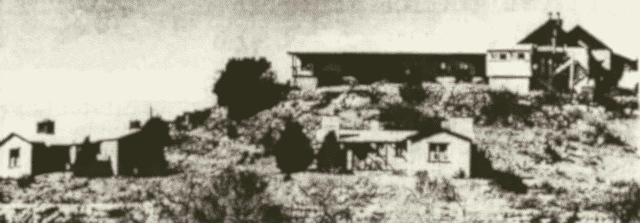
Rimrock ranch
English told Vydra that he intended to turn the ranch into a hunting lodge. He envisioned hoodlums from across the country secretly gathering to hunt in private. There was a small airstrip nearby for them to fly in without being seen.
In early 1963, Vydra joined Sam English on a visit to Arizona to inspect the ranch and pursue opportunities in the movie business. English told Vydra that he hoped to lease the property to Hollywood studies to shoot Western movies. He also thought he could obtain a contract to produce training films for the United States Air Force. [30]
Bill Bonanno, the son of mob boss Joseph Bonanno, agreed to meet with George Vydra to discuss distributing Jane Darwyn’s records through Arizona's mob-controlled jukeboxes. [39] Bonanno, who lived in Tucson, was an associate of Outfit member Joseph Amato. Amato also lived in Tucson but controlled an extensive jukebox machine route in suburban Chicago. [40] Bonanno ended up sending his associate Charles Battaglia to represent him at the meeting.
Vydra told federal agents that English took him on a tour of the ranch. At one point, English pointed out a dry well on the property and told Vydra (perhaps kiddingly), "This is where we drop boys who don’t behave." [31]
Vydra spotted nine unidentified individuals "hiding out" at the ranch. [32] The FBI suspected English was offering a refuge for mobsters on the run from authorities.
Jane Darwyn joined Vydra and English on at least one ranch visit. While there, Vydra arranged a Hollywood screen test. [33] Darwyn hoped to star in one of English’s proposed films.
Despite English’s ambitions, his plans for the ranch never got off the ground. In January 1964, the Chicago Tribune published an investigative story about English’s move into Arizona, highlighting his connections to Sam Giancana. It included a short interview with English, who admitted that he gambled in the past but was legitimate now. "What’s all this talk about the syndicate, what syndicate?" [34]
The story also linked Vydra to English, though the Berwyn alderman brushed off any concerns. "We’re lifelong friends and I’m in the meat business. He’s been buying meat from me for years."
Arizona news outlets picked up the story, which intensified the spotlight on English. Local law enforcement began to take an interest in his activities. Public opinion turned against English, making it impossible to proceed with the renovations on the property.
Vydra’s fingerprints were all over the original Chicago Tribune investigation. Eighteen months before the newspaper printed the story, Vydra secretly informed the FBI about English’s plans to develop the property. [35] The Chicago Tribune likely caught wind of the story from information supplied initially by Vydra to the FBI.
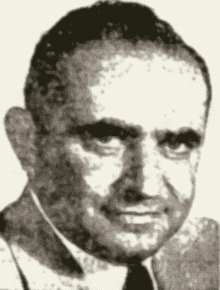
Neistein
Vydra gave federal agents a peek into the sometimes cozy relationship between the Outfit and the Illinois political establishment. Democratic State Senator Bernard Neistein represented a district on Chicago’s Westside, English brothers’ home turf. Vydra alleged Neistein and the English brothers conspired frequently in illegal activity.
In one instance, Sam English told Vydra that he and Neistein devised a tax scam that lowered the assessed valuation on real estate properties like shopping malls to reduce the owners' taxes. The owners involved in the scheme then kicked back some of the tax savings to English and Neistein. [36]
When reporters questioned Neistein and English, they denied knowing each other or meeting. Vydra reported that Neistein attended English’s son’s wedding reception at the "Villa Venice," Sam Giancana’s unofficial headquarters in the 1960s.
According to Vydra, Neistein furnished English’s ranch with surplus government furniture in a shady business deal. Neistein sold him an assortment of tables and chairs at a discount and then shipped them to Arizona, using "Vydra Movers." When reporters questioned the transaction, Neistein denied knowledge of it, despite his signature on a receipt authorizing the sale. [37]
After Vydra’s death, Neistein and English limited their interactions to "intermediaries" to avoid police surveillance.
The available FBI intelligence reports do not spell out why Vydra cooperated in the first place. It’s unclear if the FBI observed him meeting with English and then approached him for information or if he turned to the FBI after allegedly getting himself jammed up over unpaid debts to loan sharks.
The FBI recruited Vydra before he became deeply entangled with the Outfit. The timing suggests he cooperated out of a sense of duty more than helping himself out of difficult spot. If anything, Vydra conspired more closely with English after becoming an informer, suggesting that he was simultaneously following FBI directions while guiding Darwyn's career.
It raises the question of what responsibility, if any, the FBI had for Vydra's suicide. Did the FBI put Vydra in an untenable situation with unreasonable demands?
Charles Siragusa’s insistence that the Outfit murdered George Vydra may have been, in part, a clumsy attempt to embarrass the FBI. Siragusa had a longstanding institutional rivalry with the FBI going back to his tenure with the Federal Bureau of Narcotics. If the inquest revealed the Outfit killed Vydra and the FBI failed to protect him, the fallout would have humiliated FBI. The previous year, the FBI had seen another confidential informant murdered. [38]
Despite the uproar created by Charles Siragusa’s sensational comments, the Outfit never had a solid motive to kill Vydra. Based on the available intelligence reports, he never possessed overly incriminating information about Sam English. Killing Vydra would have only stirred up a hornet’s nest that would have jeopardized other illegal activities more critical to the Outfit. If Vydra owed money to loan sharks, his murder only would have ensured he could not repay it. It would have been simpler to keep Vydra alive to perform political favors.
The tension that developed between managing Darwyn and betraying a friend to please the FBI likely contributed, along with his complicated love life, to his decision to commit suicide. Vydra became another casualty of the Outfit’s relentless drive to corrupt and profit from everyone who crossed its path.
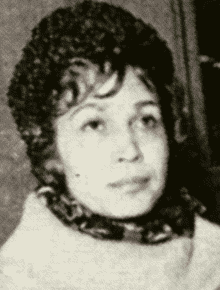
Darwyn (Jet)
Sam English sold the ranch and returned to Chicago after reporters exposed his presence in Arizona. He never faced criminal charges over his relationship with Vydra. There is no evidence that he suspected beforehand that Vydra was a confidential informer.
English’s underworld standing waned in the mid-1960s when the Outfit replaced his mentor Sam Giancana as boss. English died of natural causes in 1973.
Jane Darwyn faded from the music scene following Vydra’s death. She never became a star, but she remained appreciative all the same. "My records just didn’t sell," Darwyn said. "The public want[ed] rock n' roll. I’m a chanteuse. But Sam English did his best for me."
1 Passenger manifest of S.S. Paris, departed Le Havre, France, on Oct. 21, 1922, arrived New York on Oct. 28, 1922, New York Passenger Arrival Lists (Ellis Island), 1892-1924; Report of Birth of Children Born to American Parents, American Consular Service, Prague, Czechoslovakia, Oct. 6, 1922 (Ancestry.com); United States Census of 1930, Illinois, Cook County, Berwyn City, Ward 6, Enumeration District 16-1999; United States Census of 1940, Illinois, Cook County, Berwyn City, Ward 6, Enumeration District 16-28. George Vydra was born July 25, 1922, in Krizanov, Moravia, Czechoslovakia, when his parents, naturalized U.S. citizens Frank and Karoline Vydra, returned to visit their native country. The Vydras were residents of Chicago at that moment but apparently moved around the area a bit. George's older brother Frank Jr. had been born in the town of Cicero, located between Chicago and the Vydras' later hometown of Berwyn.
2 "Probe Berwyn Official’s Death," Chicago Tribune, Dec. 26, 1964; "Subpoena Hoods, Girl Singer in Vydra Quiz," Chicago Tribune, Dec. 29, 1964.
3 "State Crime Unit probes Vydra death," Chicago Tribune, Dec. 30, 1964.
4 "Vydra Inquest in the County Morgue," Stickney Life and Forest View, Dec. 30, 1964. Vydra had surgery for stomach cancer in 1959.
5 "Siragusa Tells View Berwyn Alderman May Have Been Slain," Chicago Tribune, Dec. 31, 1964; "Berwyn Police Are Criticized in Vydra Case," Chicago Tribune, Jan. 2, 1965.
6 "Siragusa Probes Murder Possibility At Hearing Today," Stickney Life and Forest View, Jan. 6, 1965.
7 "Suicide Verdict Handed Down in Vydra Inquest," Berwyn Life, Jan. 15, 1965.
8 Ovid Demaris, "Captive City: Chicago in Chains," New York: Lyle Stuart, Inc., 1969. p 168.
9 "Vydra Inquest in the County Morgue," Stickney Life and Forest View, Dec. 30, 1964.
10 FBI, Samuel Giancana, Chicago Office, Oct. 11, 1962, NARA Report No. 124-10297-10288.
11 FBI, Samuel Giancana, Chicago Office, Sept. 10, 1962, NARA Report No. 124-10297-10244.
12 FBI, Activities of Top Hoodlums, Chicago Office, Nov. 1, 1962, NARA Record No. 124-10196-10327.
13 "Obituaries,"" Berwyn Life, Nov. 13, 1963. Vydra had been married many years when he first met Darwyn. However, Vydra’s wife, Ruth, a school teacher, died in 1963 after a "short illness." They had no children.
14 "Probe Berwyn Official’s Death," Chicago Tribune, Dec. 26, 1964; "Subpoena Hoods, Girl Singer in Vydra Quiz," Chicago Tribune, Dec. 29, 1964.
15 FBI, Samuel Giancana, Chicago Office, Jan. 27, 1965, NARA Record No. 124-10197-10054.
16 FBI, Samuel Giancana, Chicago Office, Oct. 4, 1962, NARA Record No. 124-10297-10274.
17 FBI Samuel Giancana, Chicago Office, July 24, 1962, NARA Record No. 124-10308-10118.
18 FBI, Samuel Giancana, Chicago Office, Sept. 25, 1962, NARA Record No. 124-10297-10260.
19 FBI, Samuel Giancana, Chicago Office, Sept. 10, 1962, NARA Report No. 124-10297-10244.
20 Edmond Valin, "Fred ‘Jukebox Smitty’ Smith: The Outfit’s Most Accomplished Extortionist," Rat Trap, Jan. 2021.
21 FBI, La Cosa Nostra, Chicago Office, June 30, 1966, NARA Record No. 124-10204-10000.
22 FBI, Samuel Giancana, Chicago Office, Sept. 12, 1962, NARA Record No. 124-10297-10239; FBI, "CG 6486-C*," Chicago Office, Dec. 13, 1963, NARA Record No. 124-10354-10002.
23 FBI, Samuel Giancana, Chicago Office, Oct. 18, 1962, NARA Record No. 124-10297-10287.
24 Singles Reviews, Billboard, March 16, 1963.
25 "Arizona Hideaway Seen as Mob Haven," Chicago Tribune, Jan. 26, 1964.
26 FBI, Samuel Giancana, Chicago Office, June 30, 1966, NARA Record No. 124-10204-10000.
27 FBI, Samuel Giancana, Chicago Office, Oct. 17, 1962, NARA Record No. 124-10297-10285.
28 FBI, Samuel Giancana, Chicago Office, July 3, 1962, NARA Record No. 124-10308-10094.
29 FBI, Samuel Giancana, Chicago Office, Sept. 21, 1962, NARA Report No. 124-10297-10262; FBI, Samuel Giancana, Chicago Office, Feb. 7, 1963, NARA Record No. 124-10196-10018; FBI, Samuel Giancana, Chicago Office, Feb. 25, 1963, NARA Record No. 124-10354-10071.
30 FBI Samuel Giancana, Chicago Office, Jan. 29, 1963, NARA Record No. 124-10196-10012.
31 FBI, Samuel Giancana, Chicago Office, Oct. 2, 1962, NARA Record No. 124-10297-10277.
32 FBI, Samuel Giancana, Chicago Office, Oct. 3, 1962, NARA Record No. 124-10297-10273.
33 Record Ramblings, Cash Box, October 20, 1962.
34 "Arizona Hideaway Seen as Mob Haven," Chicago Tribune, Jan. 26, 1964.
35 FBI, Samuel Giancana, Chicago Office, Sept. 21, 1962, NARA Report No. 124-10297-10262.
36 FBI, Samuel Giancana, Chicago Office, June 30, 1966, NARA Record No. 124-10204-10000.
37 "Arizona Hideaway Seen as Mob Haven," Chicago Tribune, Jan. 26, 1964.
38 Edmond Valin, "Two Gambino Informants had very different fates," Rat Trap, Jan. 2018.
39 FBI, Samuel Giancana, Chicago Office, Aug. 7, 1962, NARA Record No. 124-10308-10131.
40 FBI, Samuel Giancana, Chicago Office, Aug. 8, 1962, NARA Record No. 124-10308-10133.